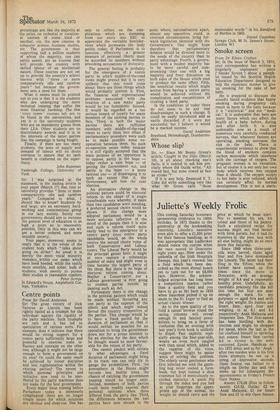Centre points
From Sir David Anderson
Sir: The great victory of Dick Taverne at Lincoln has been rightly hailed as a triumph for the individual against the rigidity of the party machine. Such triumphs are rare and it has led to speculation of various sorts. For example, does it indicate that there would be strong support for a centre party sufficiently large and powerful to exercise some influence and restraint on the other two, although it might not be large enough to form a government on its own? Or could the same result be achieved by looser discipline and less regimentation within the existing parties? The extent to which personal principles and initiative now tend to be smo thered by the party machines does not make for the best government. Every major issue coming before Parliament today is immensely complicated: there are no longer simple issues for which solutions are obvious and clear-cut. One has only to reflect on the complications which are stemming from our entry into EEC to appreciate the veritable bewilderment which permeates the body politic today. If Parliament is to function effectively a greater measure of personal liberty must be accorded its members without provoking accusations of disloyalty.
The general feeling is probably for the emergence of a centre party in which middle-of-the-road views might prevail but it is very unlikely that this could come about: there are three things which would probably prevent it. First, the financial and organisational problems associated with the creation of a new major party would be too formidable. Second, it would be regarded as a too serious breach of loyalty for many members of the existing parties to face. Third, in both the major parties there are sufficient members with middle-of-the-road views to carry them into effect if parliamentary procedure were such as to make possible some cooperation between them. No such co-operation exists today because it is still rigidly accepted that the main purpose of an opposition is to oppose, partly in the hope — today rather a vain hope — of getting the Government out, and partly in the hope — a more rational one — of disparaging it to such an extent that it, the Government, will lose the next election.
An alternative change in the political pattern could be electoral reform in the shape of .a single transferable vote whereby, if more than two candidates were standing, a preferred second choice could be shown. If this change were adopted parliament would be a more accurate reflection of the mood of the people than it is now and such a reform could quite easily lead to the emergence of a centre party since centre party candidates would, on the whole receive the second choice votes of both Conservative and Labour voters. The Liberal Party would be the principal gainer here: it might at once capture a substantial number of seats and might even in time become the largest party of the three. But there is no hope of electoral reform coming about. Neither a Conservative nor a Labour government is ever going to commit partial suicide by passing such an Act.
Fortunately there is one change in the political pattern which could be made without favouring any one party at the expense of the others and which might indeed favour the country irrespective of the parties. This change would be to have a fixed period for the duration of parliament so that it would neither be possible for an opposition to bring the government down nor for a prime minister to fix an election for the date which he thought would be most favourable for the return of his party.
One cannot predict with certain ty what advantages a fixed duration of parliament might bring in its train; one can only try to gauge the probablities. First, the atmosphere in the House might become less hostile since the chance of catching the government napping would no longer exist. Second, members of both parties could more readily express their personal opinions when these differed from the party line. Third, the differences between the two parties have now shrunk to the point where, nationalisation apart, almost any opposition could, in reversed circumstances, bring forward legislation identical with the Government's. One might hope thereforethat parliamentary debates would be directed more to the needs of the country than to party advantage. Fourth, a government with a modest majority has to be more careful and compromising than one with a big majority and freer discussion on both sides of the House which tend to produce the same effect. Fifth, the beneficial results which might accrue from having a centre party would be achieved without the complication and encumbrance of creating a third party. In the conditions of today there do not seem to be any real disadvantages in such a change. It could be easily introduced and as easily discarded if it were not successful, but I believe it would be a marked success.
David Anderson Braehead, Helensburgh, Dumbartonshire


































 Previous page
Previous page